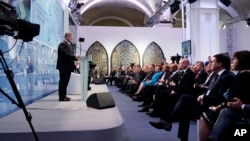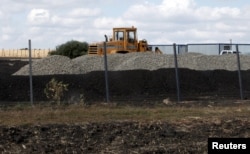Ukraine's President Petro Poroshenko said a shaky cease-fire with Russia-backed rebels has for the first time held completely for a 24-hour period since fighting broke out 15 months ago. He warned, however, that rebel-held elections would scupper the deal and called for sustained international pressure on Russia.
Poroshenko said his cautious optimism for a lasting cease-fire in Ukraine was strengthened this week after a phone call with the presidents of France, Germany and Russia.
Speaking at the annual Yalta European Strategy (YES) meeting Friday, the Ukrainian president noted a renewed cease-fire effort from September 1 seemed to be holding.
"The cease-fire in place for almost two week[s] and not a dream any more. Even more," he said. "I want to declare that today is the first day for one-and-a-half year[s] that during 24 hours we do not have one single shelled. Congratulations."
Russia's Interfax news agency quoted a Kremlin spokesman on Friday as saying an extension was possible if all parties agreed.
Deadline extension
Poroshenko rejected suggestions the Minsk agreement deadline could be extended if not fully implemented by the end of this year.
Poroshenko also said plans by Russia-backed rebels to hold separate elections from Ukrainian ones October 25 were a threat to the peace deal hammered out in Minsk.
The Ukrainian president said the vote by rebels in Ukraine's southeast, known as the Donbas, risked repeating the same scenario as 2014, when fighting killed the first peace plan.
"We have to prevent fake elections in the Donbas as it will ruin the Minsk process once again," Poroshenko said.
Poroshenko said it was time to discuss deploying an international operation to the east to ensure Russian troops returned home and the borders were sealed.
He has been pushing for a United Nations peacekeeping mission for the east, but the rebels and the Kremlin have resisted while the West is reluctant.
Despite the current peace, Poroshenko said there was still a threat from Russia as not a single Russian tank or soldier left Ukrainian territory but simply stopped shooting.
Russian military base
A Reuters report this week said Russia started to build a military base for several thousand soldiers near the Ukrainian border, suggesting preparation for a prolonged campaign.
The Kremlin has consistently denied sending troops or weapons to the rebels and said Russian servicemen captured in Ukraine are volunteers.
Poroshenko said it needs to be made clear to Russia that while current sanctions are tied to its occupation of Crimea, and fueling turmoil in the Donbas, more measures will be taken if it obstructs the peace deal.
Withdrawal of foreign troops and Ukrainian control of the border by the end of this year were two final points agreed to in the February Minsk deal; but, they are conditional on a cease-fire, decentralization of power and holding legitimate elections.
Kyiv's first step last month toward decentralization resulted in deadly clashes between nationalist opponents of the plan and police outside parliament. The rebels and Moscow have criticized the legislation because the rebels were not consulted on the wording.
Poroshenko said the international community's lack of an early and proportional response to Russia's annexation of Crimea encouraged the Kremlin to go further in supporting the rebels.
The Ukrainian president also accused Russia of spreading instability beyond Ukraine.
Poroshenko said the Kremlin was sending the same special forces who captured Ukraine's Crimean military bases, known as 'green men,' to support President Bashar al-Assad in Syria.
"These days, 'green men' are landing in the hundreds in Syria," he said, "inspiring more violence in the Middle East, and provoking an ever growing exodus of people, mostly to the European Union."
Poroshenko added, "Crimea has begun a military operation base for Russia to further destabilize Black Sea and Mediterranean in the global confrontation with the West."
Russian Foreign Minister Sergei Lavrov this week acknowledged sending arms to Syria but said troops sent there were for technical support in the fight against extremists and not fighting for Damascus.
The Ukrainian president repeated a call first made in a VOA interview for discussion of revoking Russia's veto in the United Nations Security Council.
The Ukrainian president said despite Russia's actions, Kyiv would enter into an association agreement with the European Union in January that would help deepen internal reforms.
"Russia['s] covert attempts to impede this historic event will fail,” he said. "It is impossible to stop Ukraine's resolute drive toward the European home."
The foreign ministers of France, Germany, Russia and Ukraine are to meet in Berlin on Saturday to discuss the Minsk peace deal ahead of an October summit in Paris.
The United Nations says fighting between Ukrainian forces and Russia-backed rebels has killed almost 8,000 people since it erupted in April 2014.






